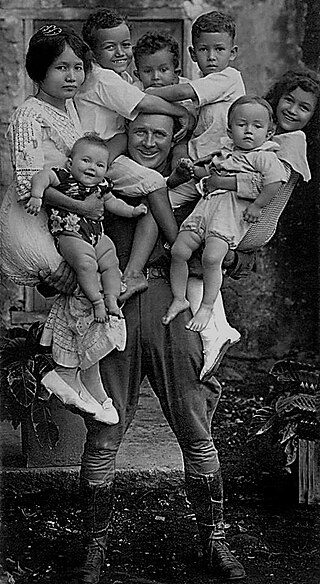Related Research Articles
Neocolonialism is the continuation or reimposition of imperialist rule by a state over another nominally independent state. This is the continuation of colonial representations and realities which remain after formal colonisation has come to an end. Neocolonialism is the control of less-developed countries by developed countries through indirect means. The term neocolonialism was first used after World War II to refer to the continuing dependence of former colonies on foreign countries, but its meaning soon broadened to apply, more generally, to places where the power of developed countries was used to produce a colonial-like exploitation.Neocolonialism takes the form of economic imperialism, globalization, cultural imperialism and conditional aid to influence or control a developing country instead of the previous colonial methods of direct military control or indirect political control (hegemony).

A military alliance is a formal agreement between nations that specifies mutual obligations regarding national security. In the event a nation is attacked, members of the alliance are often obligated to come to their defense regardless if attacked directly. Military alliances can be classified into defense pacts, non-aggression pacts, and ententes. Alliances may be covert or public.
ZNetwork, formerly known as Z Communications, is a left-wing activist-oriented media group founded in 1986 by Michael Albert and Lydia Sargent. It is, in broad terms, ideologically libertarian socialist, anti-capitalist, and heavily influenced by participatory economics, although much of its content is focused on critical commentary of foreign affairs. Its publications include Z Magazine, ZNet, and Z Video. Since early November 2022, they have all been regrouped under the name ZNetwork.
A colonial mentality is the internalized attitude of ethnic or cultural inferiority felt by people as a result of colonization, i.e. them being colonized by another group. It corresponds with the belief that the cultural values of the colonizer are inherently superior to one's own. The term has been used by postcolonial scholars to discuss the transgenerational effects of colonialism present in former colonies following decolonization. It is commonly used as an operational concept for framing ideological domination in historical colonial experiences. In psychology, colonial mentality has been used to explain instances of collective depression, anxiety, and other widespread mental health issues in populations that have experienced colonization.
Internal colonialism is the uneven effects of economic development on a regional basis, otherwise known as "uneven development" as a result of the exploitation of minority groups within a wider society which leads to political and economic inequalities between regions within a state. This is held to be similar to the relationship between a metropole and a colony, in colonialism proper. The phenomenon leads to the distinct separation of the dominant core from the periphery in an empire.
The Bell Trade Act of 1946, also known as the Philippine Trade Act, was an act passed by the United States Congress specifying policy governing trade between the Philippines and the United States following independence of the Philippines from the United States. The United States Congress offered $800 million for post World War II rebuilding funds if the Bell Trade Act was ratified by the Philippine Congress. The specifics of the act required the 1935 Constitution of the Philippines be amended. The Philippine Congress approved the measure on July 2, two days before independence from the United States of America, and on September 18, 1946 approved a plebiscite to amend the Constitution of the Philippines.
Syncretic politics, or spectral-syncretic politics, combine elements from across the conventional left–right political spectrum. The idea of syncretic politics has been influenced by syncretism and syncretic religion. The main idea of syncretic politics is that taking political positions of neutrality by combining elements associated with left-wing politics and right-wing politics can achieve a goal of reconciliation.
The Association for Asian Studies (AAS) is a scholarly, non-political and non-profit professional association focusing on Asia and the study of Asia. It is based in Ann Arbor, Michigan, United States.
The Committee of Concerned Asian Scholars (CCAS) was founded in 1968 by a group of graduate students and younger faculty as part of the opposition to the American participation in the Vietnam War. They proposed a "radical critique of the assumptions which got us [The United States] into Indo-China and were keeping us from getting out". The caucus was held at the Association for Asian Studies convention in Philadelphia, but was a radical critique of that professional association's values, organization, and leadership. The group was largely formed due to the Association for Asian Studies lack of public stance on the Vietnam War. Most of the original members were graduate students or junior faculty in Area Studies programs at Harvard, Stanford, University of Michigan, University of California at Berkeley, and Columbia University, although there were also independent scholars and those with no affiliation in the field.

American settlement in the Philippines began during the Spanish colonial period. The period of American colonialization of the Philippines was 48 years. It began with the cession of the Philippines to the U.S. by Spain in 1898 and lasted until the U.S. recognition of Philippine independence in 1946.
Benedict F. "Ben" Kiernan is an Australian-born American academic and historian who is the Whitney Griswold Professor Emeritus of History, Professor of International and Area Studies and Director of the Genocide Studies Program at Yale University.

Third-worldism is a political concept and ideology that emerged in the late 1940s or early 1950s during the Cold War and tried to generate unity among the nations that did not want to take sides between the United States and the Soviet Union. The concept is closely related but not identical to the political theory of Maoism–Third Worldism.
Southeast Asian studies (SEAS) refers to research and education on the language, culture, and history of the different states and ethnic groups of Southeast Asia. Some institutions refer to this discipline as ASEAN Studies since most of the countries that they study belong to the Association of Southeast Asian Nations or ASEAN. Definitions of what constitutes Southeast Asia differ between scholars, which blurs the boundaries between Southeast Asian studies and other regional studies like Oriental studies and post-colonial studies. Southeast Asian studies incorporates anthropology, religious studies, linguistics, and international relations.
The 1973 Philippine martial law referendum was a national referendum in which the citizens' assemblies voted for:

The Mencius is a collection of conversations, anecdotes, and series of genuine and imagined interviews by the Confucian philosopher Mencius. The book is one of the Chinese Thirteen Classics, and explores Mencius' views on the topics of moral and political philosophy, often as a dialogue with the ideas presented by Confucianism. The interviews and conversations are depicted as being either between Mencius and the various rulers of the Warring States period, or with his students and other contemporaries. The book documents Mencius' travel across the states, and his philosophical conversations and debates with those he meets on his journey. A number of scholars suggest that the text was not written by Mencius himself, but rather by his disciples. The text is believed to have been written during the late 4th century BC.

Vicente Gregorio Baltazar Lava Sr. was a Filipino chemist who supported efforts towards economic independence for the Philippines and later became a leader in the communist resistance against the Japanese occupation of the Philippines.
Guillermo Capadocia (1909–1951) was a Filipino communist politician and labour leader. He was a prominent leader of the Communist Party in the Philippines (PKP) and different labour movements. During the last one and a half years of his life he was a regional guerrilla commander of the Hukbalahap.

Libyan nationalism refers to the nationalism of Libyans and Libyan culture. Libyan nationalism began to arise with the creation of the Senussi religious orders in the 1830s that blended North African Sufism with orthodox Islam. After colonization of Libya by Italy, opponents of Italian colonial rule from Tripolitania and Cyrenaica combined forces in 1922, with Senussi leader Omar Mukhtar leading the revolt against Italian forces in Libya. Libya became an independent state after World War II.
The Aguman ding Maldang Talapagobra (AMT) (Kapampangan, League of Poor Laborers or League of Poor Workers) was a trade union in Pampanga, Philippines, organized by Pedro Abad Santos in 1933. It was influenced by European socialism and anarchism, functioned as a mutual aid association, and participated in electoral politics.

The Mahidi was a militia in East Timor loyal to Indonesia. Its origin is traced back to groups who lost lands and power for fighting the Portuguese and those who collaborated with the Japanese during World War II. The militia was founded in December 1998 and its operations were centered around the Cassa area in the southern Ainaro district. The location is strategic since it is at the crossroads between Manufahi, Ainaro, and Cova Lima districts. Mahidi participated in the 1999 East Timorese crisis, and the group was one of the most violent of the armed forces during the crisis. They were linked to the Suai Church massacre which led to around 200 deaths as well as other mass killings.
References
- 1 2 "Zcomm » Author » Stephen R. Shalom". zcomm.org. Retrieved 2022-05-20.
- ↑ Shalom, Stephen R. (1977-01-01). "Counter-insurgency in the Philippines". Journal of Contemporary Asia. 7 (2): 153–177. doi:10.1080/00472337785390131. ISSN 0047-2336.
- ↑ Shalom, Stephen R. (1990-12-01). "Securing the U.S.-Philippine military bases agreement of 1947". Bulletin of Concerned Asian Scholars. 22 (4): 3–12. doi: 10.1080/14672715.1990.10413097 . ISSN 0007-4810.
- ↑ Schirmer, Daniel B.; Shalom, Stephen Rosskamm (1987). The Philippines Reader: A History of Colonialism, Neocolonialism, Dictatorship, and Resistance. South End Press. ISBN 978-0-89608-275-5.
- ↑ Shalom, Stephen R. (2011-01-01). "Killing in War and Moral Equality*". Journal of Moral Philosophy. 8 (4): 495–512. doi:10.1163/174552411X592158. ISSN 1745-5243.